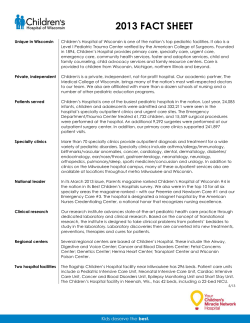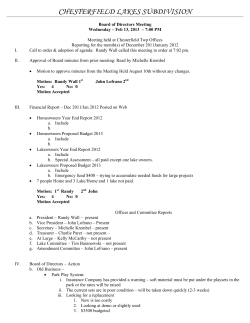
Check it out! - West Wisconsin Land Trust
Fall 2014 Newsletter INSIDE THIS ISSUE ADDITIONS TO THE BOARD PARTNERING TO PROTECT WESTERN WI STREAMS POGO LAKE BIRD SANCTUARY ADDITION TRIMBELLE RIVER CAMP AMNICON Conserving Land on the Lake Superior Coast Amnicon River Camp Amnicon, a youth ministry camp in northern Douglas County, has donated a conservation easement to West Wisconsin Land Trust which permanently protects 500 acres of their land on the south shore of Lake Superior. Partners in this effort include Enbridge, the US Fish & Wildlife Service, and the Wisconsin Stopover Initiative. Held by the land trust, the easement will maintain the unique conservation values of this property in perpetuity. This beautiful portion of the Lake Superior Coastal Plain includes two miles of wild Amnicon River frontage and onehalf mile of Lake Superior shoreline. The Amnicon River originates at Lyman Lake and then flows for thirty miles, descending 640 feet before joining Lake Superior. The Amnicon is designated as Outstanding Resource Water by the State of Wisconsin. An innovative feature of the easement is the creation of a significant new opportunity for migratory bird research. The camp and the land trust are partnering with the Wisconsin Stopover Initiative to enable avian researchers to utilize this land for long-term studies of the habits and needs of these birds. The Stopover Initiative is a collaboration of public agencies, private organizations, individuals, and businesses working to provide habitat for migratory birds. In addition to being ecologically important on its own accord, Camp Amnicon is contiguous to over 800 acres of neighboring private properties that are also under conservation easements Welcome Dear Friends, Welcome to our fall newsletter. As you may have noticed, we now have multiple “channels” for you to keep up with the work of the land trust. In addition to this fall print publication, we publish an annual report every spring, a monthly e-newsletter, a Facebook page, and our website. As we all know, communicating can be a complicated business these days! We hope that one or more of these formats will be just right for you. We are now in an important fund raising period. The largest portion of our individual gifts comes to us in the final quarter. This year-end giving season is critical to our continued pursuit of land conservation, as over half of our income is from individuals. If you have already contributed this year, thanks again for your generosity and for your commitment to conservation. If your membership is up for renewal, I want to thank you in advance for taking the time to carefully consider the request you will be receiving from us. These gifts are your investment in this corner of the world that we all love and that continues to sustain us in so many ways. We look forward to continuing to work together to preserve the best of this landscape for all the generations to come. -Bob Fitzwilliam Executive Director bfitzwilliam@wwlt.org held by West Wisconsin Land Trust. The combined 1,300+ acres is critical habitat that will be conserved forever. Camp Amnicon has offered wilderness trips and retreat programs to youth, adults, and families from all backgrounds for almost fifty years. According to the camp’s executive director, Alana Butler, the camp strives “to connect the mission of the Evangelical Lutheran Church in America with the care of God’s creation through community based camping, family camps, and retreats.” Ms. Butler and the camp’s board feel that this conservation easement with a research component fits perfectly with the camp’s mission and its commitment to good stewardship of the camp’s lands. Funding for this project was made possible through a grant from the US Fish and Wildlife Service, as well as generous gifts from supporters of Camp Amnicon, from Enbridge, and from members of West Wisconsin Land Trust. NEW MEMBERS OF THE WWLT TEAM Conservation We are pleased to announce that Andrew Norman has joined our conservation department as conservation specialist. He graduated from UW-Eau Claire with a B.S. in Geography and Resource Management and has most recently been working parttime as a wildlife technician with the DNR. In this halftime position at the land trust, Andrew is providing much needed help for our annual monitoring of 175 conservation easements, as well as supporting the implementation of new projects. Communications Two Great Additions to the Board This spring we welcomed long-time Menomonie resident Bill Butsic to the WWLT board. Bill recently retired from managing the Con Agra (Swiss Miss) production facility in Menomonie. He originally hails from the UP of Michigan and is an avid cross-country skier and all around outdoors enthusiast. He is a very active volunteer in the Dunn County community, serving on a number of boards and local initiatives. 2 We feel similarly fortunate to have Rory Cameron join us for a two-year term. Rory has served as a circuit judge in Chippewa Falls since 1983. A native of Rice Lake, he is a member of Beaver Creek Reserve in Fall Creek and president of the Beaver Creek Bird Club. Rory is passionate about birds and participates in annual owl, marsh bird, and Golden Eagle surveys. Other interests include running, biking, and playing the highland bagpipes. This year we were also happy to welcome Scott Fischer to our communications team. Scott is a senior in the Entertainment Design program at UW-Stout and is helping us to polish and keep current our various digital publications. We may not need any of the Pixar-like special effects that Scott can cook up, but we are very much appreciating the extra design help and his terrific problem-solving skills. Scott’s work is supported by a grant from the Community Foundation of Dunn County. CONSERVATION PLANNING GAINS MOMENTUM Brule River Watershed West Wisconsin Land Trust is partnering with the newly formed Brule River Coalition to produce a road map for conservation planning in the watershed of this Wisconsin jewel. Funding for our effort has come from the Biodiversity Fund of the Duluth/Superior Area Community Foundation, as well as the Midwest Office of the Land Trust Alliance. We are happy to be joining forces with Brule River Preservation, Inc. and a host of other organizations to assess the needs of the watershed and to develop a conservation action plan. To learn more about this initiative visit bruleriverpreservation.org. CONSERVING OUR NORTHWOODS HERITAGE Pogo Lake Pogo Lake, also known as Big Lake, is located in central Polk County within the West Wisconsin Land Trust Northwoods Landscape. This 135-acre project is an addition to a 240-acre conservation easement completed in 2003. The now 375-acre project encompasses the entirety of Pogo Lake and nearly two miles of wild, natural shoreline surrounded by mature northern drymesic forest, tamarack-black spruce bog, and moist sandy meadow. Ephemeral ponds dot the forest. The diverse, hummocky topography on the property is indicative of the outwash plain found along the terminal moraine of Wisconsin’s last glacier. After the first phase of the project was completed over a decade ago, owners Tim Dickinson and Terri Tacheny were committed to permanently protecting LAND TRUSTS JOIN FORCES FOR LAKE SUPERIOR LAND CONSERVATION West Wisconsin Land Trust provided support to Bayfield Regional Conservancy (BRC) in order to conserve the headwaters of North Pikes Creek, which is located near the tip of the Bayfield peninsula. Over the past year BRC received funding from WWLT’s US Fish & Wildlife funded South Shore Streams project, the Knowles-Nelson Stewardship Program, and also the USDA Community Forest Program in order to acquire the 280-acre wetland. BRC will own the property and will work with the Friends of North Pikes Creek to manage it for long-term water quality, species conservation, and sediment reduction, as well as for public education and enjoyment. the north half of the lake. Their foresight ensures that Pogo Lake and its varied forest and wetland communities will remain as we see them today. Wildlife on the property is abundant, with bald eagles and nesting trumpeter swans commonly seen on and around the lake. And because diversity begets diversity, the property teems with a wide array of plants, animals and birds—each in tune with its own unique habitat. Pogo Lake is located within the Straight Lake Conservation Opportunity Area, as identified in the Wisconsin Department of Natural Resources Wildlife Action Plan. This area is significant in the upper Midwest for its habitat and geological attributes. Straight Lake State Park, the cornerstone of the area, is approximately three miles northwest of the property. 3 Bird Sanctuary Addition PARTNERING TO PROTECT WESTERN WI STREAMS In Douglas County, adjacent to the area known locally as the Bird Sanctuary, we are working to acquire approximately twenty-four critical acres. The land is immediately adjacent to the Solon Springs Sharptail Barrens State Natural Area, within the 4,000-acre Douglas County Wildlife Area. It is located within a landscape designated as Wisconsin Priority Conservation Opportunity Area for Wildlife Species of Greatest Conservation Need and is regarded as globally significant. The acreage contains the flora and fauna of the pine barrens with scattered clumps of jack pine, Hill’s oak, bur oak grubs, and occasional red pine. The vegetation is characteristic of the pre-settlement vegetation that once covered much of northwestern Wisconsin. Maintained by fire, the barrens are one of the best sharptailed grouse habitats in Wisconsin. We are seeking funding from the Knowles-Nelson Stewardship Program and from our project partner, the Friends of the Bird Sanctuary. Their website is fotbs.org. LOCAL ORGANIZATIONS PROVIDE SUPPORT FOR Punchbowl Spruce Up We are happy to report that Fairmount Minerals will be donating $5,000 toward the construction of the new stairs at the Devil’s Punchbowl near Menomonie. This effort has become a terrific collaboration among a wide variety of business- 4 es, civic organizations, and individual donors. Also pitching in with significant donations are: Community Foundation of Dunn County, Cedar Corp., Dunn Energy’s Round Up Fund, Menomonie Noon Rotary, and WESTconsin Credit Union. We anticipate construction being completed this fall. The McKnight Foundation has awarded $50,000 to West Wisconsin Land Trust to support permanent protection and public access along streams in western Wisconsin. This two-year grant enables the land trust to collaborate with the Wisconsin DNR’s stream bank program, which aims to add 100 miles of public access statewide through the purchase of permanent easements from private landowners. This will result in increased public access for fishing and wildlife observation, and provides for permanent conservation of these riparian lands. Our newest staff member, Andrew Norton, is WWLT’s point person for this effort. He is working with area DNR staff to provide additional on-theground support. He will be meeting with landowners as needed and developing site information for stream bank easement purchases. We are hoping this added effort helps create a high number of easements in western Wisconsin. We are extremely grateful for McKnight’s support for this work and their ongoing commitment to our region’s aquatic resources. Trimbelle River This project will acquire 40 acres of land in Pierce County containing the Trimbelle River corridor and associated riparian acreage. The property lies within the heart of a large landscape of protected floodplain forest habitat and will provide important wildlife habitat and recreational opportunities. This is the last parcel needed to complete a 451-acre block of publically accessible conservation land in a county that has greater than 95% of the land in private ownership. All of this land will be managed for wildlife habitat and public recreation. The property contains approximately one-half mile of frontage on the Trimbelle River, a Class II trout stream, which runs north to south through the property. The Trimbelle River is also considered a Wisconsin Exceptional Resource Water, and is a priority for protection. We hope to acquire this property with funding from the Knowles-Nelson Stewardship Program, as well as funding from the Kinnikinnic Chapter of Pheasants Forever. We expect to wrap up the project this fall. A LANDOWNER’S STORY Why I Love This Place So many of our land projects begin with one family’s affection for a particular piece of land. Such is the case with this Chippewa County farm that has been protected by a conservation easement held by the land trust. Nestled on the southern edge of the Chippewa Moraine near New Auburn, these 240 acres are a remarkably diverse mix of forest, wetlands, kettle lakes, and agricultural fields. And right through it all flows McCann Creek, a Class I brook trout stream. Nearby are hundreds of acres of state recreation land. Sally grew up here and still sees those fields and forests every day. In 2005, she decided to conserve it forever. Below, in her own words, Sally describes what this small piece of western Wisconsin has meant to her and to her family. My soul knew this place before my conception and my soul will know this place long after I am gone. Outer landscapes have shaped inner landscapes. This place has raised more than just crops and dairy animals. This place is not done raising me yet. This place has been a childhood playground full of delights: a big front yard to play ball in; a creek to wade in; a hill to slide on; ponds to catch frogs in; a barn full of cows for milk and witnessing the birth of calves; a haymow rope to swing on; a large garden to pick and eat fresh produce from; a clothesline to make a tent of blankets to sleep outdoors. This place has been a workforce development camp. Farm chores were done daily on a regular schedule. Teamwork, responsibility, accountability and creative problem solving were not only encouraged but needed. It was here that I learned physical labor has the power to free the mind of worries. It was here that I learned time spent outdoors is good for the body and soul. This place has been my college dorm. Finding it less expensive to commute to University of Wisconsin – Eau Claire from New Auburn, I stayed home on the farm. The folks bought my commuter car and paid for my college education. My mother would do my chores so I could spend more time studying, but I helped when I could - while going to school and for years beyond. This place has been my weekend destination when I worked my first professional job in Wisconsin Rapids. This place has been my home when I found new employment in Chippewa Falls. A few years later I married but continued to visit weekly, helping my folks with projects and maintenance. This place has been my sanctuary at the end of my marriage. The best way for me to heal was to get back to my rural roots. This place has been a hospice for both of my parents. Dad called it his “private” nursing home. This place has been my home during my career in healthcare. Now I am developing new skills and talents here. This place has been permanently protected and preserved as an everlasting expression of my gratitude for the “groundworks”. That protection ensures that this place will forever continue to support my growth and spiritual evolution. - Sally Lewis 5 West Wisconsin Land Trust NONPROFIT ORG U.S. POSTAGE 500 East Main Street, Suite 307 PAID Menomonie, Wisconsin 54751 EAU CLAIRE, WI PERMIT NO. 2141 RETURN SERVICE REQUESTED “A deep familiarity between a local community and a local landscape is a dear thing, just in human terms. It’s also, down the line, money in the bank, because it helps you to preserve the working capital of the place.” - Wendell Berry This newsletter is published by: West Wisconsin Land Trust 500 East Main Street, Suite 307 Menomonie, Wisconsin 54751 Phone: 715-235-8850 www.wwlt.org ©2014 – All rights reserved NEW WAYS TO KEEP IN TOUCH! Visit us on Facebook! www.facebook.com/ westwisconsinlandtrust Sign up for our monthy e-newsletter by e-mailing to wwlt@wwlt.org with “subscribe” in the subject line and your name in the message.
© Copyright 2025










